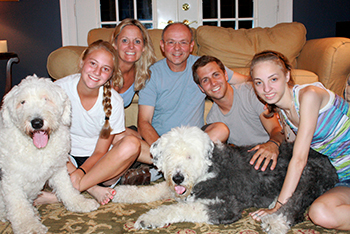 The Constitution only gives people the right to pursue happiness,” Benjamin Franklin said. “You have to catch it yourself.”
The Constitution only gives people the right to pursue happiness,” Benjamin Franklin said. “You have to catch it yourself.”
This pursuit involves chasing a slippery target, notes Gregory Van Rybroek, a psychologist at Mendota Mental Health Institute in Madison, who also has a law degree and is a member of the Wisconsin Lawyers Assistance Program (WisLAP) Committee. He regularly gives talks to attorneys on the subject of happiness, which he aptly titles “The Slipperiness of Happiness.”
Van Rybroek observes that for many attorneys, happiness is an awkward topic for discussion. He can sense discomfort in the room when he gives his presentations.
“Lawyers tend to be terrifically bright above the neck,” he says. “But happiness has quite a bit to do with below the neck, somewhere between the heart and gut. Many lawyers are terribly uncomfortable with their feelings.”
So what does happiness mean anyway, and what does it mean to lawyers specifically? A recent research study – titled “What Makes Lawyers Happy?” – aimed to find some answers.
In describing their intention, the researchers stated that rather than addressing whether lawyers are happy, their study investigated who in the profession is happy, or not, and why they feel that way.

“Lawyers tend to be terrifically bright above the neck. But happiness has quite a bit to do with below the neck, somewhere between the heart and gut,” says Gregory Van Rybroek, Mendota Mental Health Institute, Madison. “Many lawyers are terribly uncomfortable with their feelings.” Of a family photo taken a few years back, Van Rybroek said, “I don’t know how to depict ‘happiness’ … but this is close.”
Common thinking is that if someone exited a good law school at the top of the class, had been a member of law review, and then landed a high-paying job, he or she would be a poster child for the “happy lawyer.”
Not necessarily so, according to this study.
Beyond Satisfaction
Several previous studies have measured lawyer career satisfaction, says Lawrence Krieger, clinical professor of law at Florida State University College of Law, who co-authored the happiness study with Kennon Sheldon, professor of psychology at the University of Missouri – Columbia. But career satisfaction and happiness are not one and the same, the authors emphasize.
“People can be satisfied with their job and still be depressed,” Krieger explains. “We address that in this study. Other studies ask ‘How satisfied are you with your career?’ But those studies are not using established measures to correlate lawyers’ reported job satisfaction with their well-being. Are they happy? Depressed? What is their emotional state?”
Lawyer Happiness: What Matters, What Doesn’t?
Common thinking is that if someone exited a good law school at the top of the class, had been a member of law review, and then landed a high-paying job, he or she would be a poster child for the “happy lawyer.” Not necessarily so, according to a national study of more than 6,200 lawyers, judges, and other law-related professionals in four states, including Wisconsin.
The study asked participants about various factors possibly linked to their well-being, including need satisfaction, values, motivation, and perceived autonomy support at work.
Internal Factors: Highest Correlations to Happiness
The following “internal” factors were found to have the strongest correlations to well-being (“1” being the highest level of correlation possible, and a “0” indicating no correlation at all):
- Autonomy, or being authentic and having a sense of control over one’s choices (.66)
- Relatedness to others (.65)
- Feeling competent in performing one’s job (.63)
- Internal motivation at work (.55) – that is, finding the work itself meaningful, enjoyable, rather than being motivated by external factors, such as pressure from others or needing to impress others
- Autonomy support at work (.46)
- Intrinsic values (.30) – these may include personal growth, helping others, etc., in contrast to such extrinsic values as power, affluence, and so on.
External Factors: Relatively Unimportant to Happiness
External factors had the lowest correlations, including:
- Income (.19)
- School debt (.19)
- Class rank in law school (.12)
- Law review membership (.00)
Other Key Findings
- Having autonomy on the job is 3.5 times as important as income and 5.5 times as important as law school class rank in predicting if a lawyer finds
happiness.
- Lawyers in “prestige” jobs were not as happy as those in “service” jobs (public defenders, government lawyers, legal services attorneys, and so on). The survey respondents reporting the highest levels of well-being were judges.
- Law students become heavily focused on the very same “external” factors that have weak correlations to happiness after law school.
Problems such as alcoholism, anxiety, depression, drug abuse, and incivility point to a good deal of unhappiness among many in the legal profession. Even if such symptoms are absent, the daily stresses and frustrations on the job can be a drain on a lawyer’s sense of well-being or happiness. Krieger and Sheldon consider those two terms to be interchangeable.
In the study, “we measured positive and negative affect, or mood,” Krieger says, “and then overall life satisfaction. We added those together to get a happiness measure.” In the study, they refer to this measure as “subjective well-being.”
The researchers aimed to uncover what factors are most relevant to happiness for attorneys. They compiled data from more than 6,200 lawyers, judges, and other law-related professionals currently working in four states, including Wisconsin.
Roughly 1,600 State Bar of Wisconsin members participated in the survey, says Linda Albert, WisLAP manager. The State Bar was eager to assist in the happiness study.
“In WisLAP, our lawyers have talked about this for years,” she says. “Now we have data from a peer-reviewed study of a large number of people. I think this research shows that lawyers aren’t really that different from other people. They have basic psychological needs for well-being.”
The researchers shared the data on the Wisconsin participants with the State Bar, which had Clearspring Research in Madison analyze this data separately. The findings for the state’s lawyers “closely paralleled the aggregate data for the entire group,” Albert says.
What Matters, What Doesn’t
The study asked participants about various factors possibly linked to their well-being, including need satisfaction, values, motivation, and perceived autonomy support at work. In addition, the study asked about law school experiences, current working circumstances (area of practice, hours worked, billable hours, and so on), personal life choices, and demographic information.
Krieger and Sheldon then analyzed how these factors correlated with subjective well-being, with “1” being the highest level of correlation possible, and a “0” indicating no correlation at all.
The factors found to have the strongest correlations were those deemed to be “internal” factors, including:
Autonomy, or being authentic and having a sense of control over one’s choices (0.66)
Relatedness to others (0.65)
Feeling competent in performing one’s job (0.63)
Internal motivation at work (0.55) – that is, finding the work itself meaningful, enjoyable, and so on, rather than being motivated by external factors, such as pressure from others or needing to impress others
Autonomy support at work (0.46)
Intrinsic values (0.30) – these may include personal growth, helping others, and so on, in contrast to such extrinsic values as power, affluence, and others
External factors had the lowest correlations, including:

“I have my own cases and generally speaking, I can control them. No one likes it when someone else dictates every decision you make.” – Scott Butler, Fitzpatrick, Skemp & Associates LLC, La Crosse
A closer look at the correlations reveals, for instance, that having autonomy on the job is 3.5 times as important as income and 5.5 times as important as law school class rank in predicting if a lawyer finds happiness.
“The external factors are relatively unimportant for happiness,” Krieger concludes, “and the internal ones are critical.” He adds that the latest study of lawyers reinforced findings from earlier studies he and Sheldon have done of law students. While the research team expected this to happen, “what surprised us,” Krieger says, “is how strongly this study validated” earlier findings.
What the Study Means for Employers
What can law firms and other employers do to enhance the happiness of their lawyers? Also – and this is probably the first question that springs to employers’ minds – why should they bother to do so? The researchers say there are two key reasons: productivity and retention.
“Number one, you want your people to be highly productive,” Krieger says. “Number two, you want them to stay with you long term because if they leave, you lose an asset you’ve just trained. The happy ones stay; the unhappy ones don’t.”
Van Rybroek agrees that employers benefit by paying attention to lawyers’ well-being. Still, he notes, some law firms’ primary emphasis is on boosting the bottom line, which means they’re interested in rainmakers. “What they don’t see,” he says, “is that there’s a connection between the rain and the well-being of the people who are making the rain.”
13 Factors Crucial to Healthy Legal Workplaces
Proclaimed to be a “world first,” a new set of guidelines aims to improve psychological health and well-being among legal professionals.
Developed by the Tristan Jepson Memorial Fund in Australia, the guidelines were drawn from Canadian workplace standards devised by researchers at Simon Fraser University in Vancouver, Canada, and then adapted to suit the legal profession. Marie and George Jepson created the Tristan Jepson Memorial Fund after their son, a law student, committed suicide.
The guidelines generally are applicable to law offices in the United States and speak to the findings in the “What Makes Lawyers Happy?” study by Lawrence Krieger and Kennon Sheldon, described in the accompanying main article.
The guidelines identify 13 psychosocial factors that are vital to healthy legal workplaces:
- Organizational culture – a workplace characterized by trust, honesty, and fairness
- Psychological and social support – support for employees’ psychological and mental health concerns
- Clear leadership and expectations – people know what they are expected to do and how their work contributes
- Civility and respect among all in the office
- Psychological competencies and requirements – a good fit of interpersonal and emotional competencies and roles
- Growth and development – encouragement and support of interpersonal, emotional, and job skills
- Recognition and reward in a timely fashion
- Good involvement and influence from people in the office – they are included in discussions about their work and how important decisions are made
- Workload management – work can be accomplished successfully within the time available
- Engagement – people feel connected to their work and motivated
- Balance – recognition of the need for balance between work and family/personal life
- Psychological protection – appropriate actions are taken to protect people’s psychological safety
- Protection of physical safety – appropriate actions are taken to protect physical safety
To learn more, see www.tjmf.org.au.
Scott Butler, a WisLAP volunteer and a young La Crosse lawyer who’s been practicing for four years, says he has autonomy in his current job with a small firm. “I have my own cases,” he says, “and generally speaking, I can control them. No one likes it when someone else dictates every decision you make.” He also benefits from a supportive environment working with his colleagues, and, in turn, he feels competent on the job. “That all goes into doing good work for my clients,” he says.
Those three positives that rank highest on the above list – autonomy, relatedness, and feeling competent – all flow from supportive supervision, which Krieger defines as supervision that makes people feel respected and understood. This style of supervision can be learned, he says; it’s not a matter of an innate skill you either have or don’t.
Supportive supervision “involves anything you can do to show respect and understanding,” he says. “Do people feel you have their back and that you understand what they want? Do you allow them to do their work in the way they feel they can do it best?”
In her work as a personal trainer, Andrea Hoeschen sees what happens when lawyers don’t feel they have that kind of support. She practiced law full-time for 14 years and now devotes about one-third of her time to practicing employment law and the rest to Starting Line Athletics, a personal training business she co-owns with a nonlawyer. She is also the new WisLAP Committee chair as of July 1, 2015.
“A common theme I hear from the lawyers among my personal training clients,” she says, “is that they feel they have no control over their practice, their caseload, or the amount they work. I also hear that from other professionals. Lack of autonomy is a source of stress in other professions, too.”
Other common themes she hears from attorneys relate to feelings of isolation. That’s where the second factor on the list above – relatedness – enters in. Law offices would do well to foster feelings of connection, Hoeschen says, both among people in the office, and on the outside.
Simply proclaiming, for instance, that the firm is family-friendly is not enough. “You need leaders in the firm to show younger lawyers that it’s okay to be involved in your family and your community,” Hoeschen says, “and to show how that has a positive effect on the way they approach the practice of law.”
The resulting feeling of relatedness also feeds autonomy, Hoeschen points out. “Being involved in the community is a great business development tool,” she says. “And nothing has more impact on autonomy for a young lawyer than being able to bring in a new client.”
What the Study Means for Law Schools
Years before the current research, Krieger and Sheldon began their investigation of lawyer happiness by examining the mental health of law students as they progressed through law school.
Their research, reported in previous studies, found that law students’ values and motivations shift. Many students abandon the reasons they went to law school in the first place (helping others, finding personal meaning in the work, and so on) and get caught up in competing for class rank, getting on law review, and landing a high-paying job.

“If you as a law school can concentrate on supporting autonomy, relationships, and collaboration, then you’re doing a good job,” says Marsha Mansfield, clinical professor, U.W. Law School, Madison. Canoeing in the Boundary Waters is one of Mansfield’s favorite pastimes.
The upshot is that students become heavily focused on the very same external factors that have weak correlations to happiness after law school, according to Krieger and Sheldon’s current study.
So what can law schools do to get students headed in a better direction? “If you as a law school can concentrate on supporting autonomy, relationships, and collaboration, then you’re doing a good job,” says Marsha Mansfield, clinical professor at U.W. Law School.
One of the best places in law school for students to gain those types of experiences is in clinical programs, Mansfield says, in which students work closely and collaboratively with other students and faculty supervisors. “That provides a safe place for students to explore their autonomy,” she says.
Fun activities – such as the U.W. Law School’s practice of having faculty serve ice cream to students on the last day of classes – help to take the intensity level down a notch. But above all, there’s an ongoing need to relay the message that “it’s not all about law review and grades and high-paying jobs,” Mansfield says. “There’s more out there than that.”

“Being involved in the community is a great business development tool. And nothing has more impact on autonomy for a young lawyer than being able to bring in a new client.” – Andrea Hoeschen, attorney & personal trainer, Milwaukee
Marquette Law School also tries to attend to nurturing those internal factors Krieger and Sheldon talk about, according to Amy Rogan-Mehta, director of student development and academic success. She cites, for instance, a high level of mentoring of students by faculty as one key element in a supportive environment.
“We also have student-to-student mentoring,” she says, “in which upper-level students teach our first-year students how to brief cases, answer professors’ questions in class, prepare for exams, and so on” in order for them to succeed in law school. Rogan-Mehta and Matthew Parlow, associate dean for academic affairs, work closely with the upper-level students to provide guidance.
Another offering for students is the “Lawyers in Life” semester-long workshop, which focuses on goal setting, developing emotional intelligence, and achieving both professional and personal success.
“We try to get students on a good road while they’re here,” Rogan-Mehta says. “I think there’s an awareness that it’s not just what you learn and the grades you get. It’s the experiences available to you to help you through the process of discerning what kind of attorney you are going to be.”
What the Study Means for Individuals
Law firms and law schools can make changes to create environments conducive to lawyers finding happiness. Individuals, too, must be willing to take steps to shift from “unhappy” to “happy,” Van Rybroek says. But, of course, undertaking change is never easy.

“I think there’s an awareness that it’s not just what you learn and the grades you get. It’s the experiences available to you to help you through the process of discerning what kind of attorney you are going to be.” – Amy Rogan-Mehta, director of student development and academic success, Marquette Law School, Milwaukee
“You have to sit down and strip bare and think about yourself and your life,” he says, “such that you can get closer to whatever happiness means for you.”
Stepping Back. Some years ago, Brookfield attorney and WisLAP volunteer Larraine McNamara-McGraw had reached a point at which anger ruled her day-to-day life as an employment and civil rights litigator. “I was internalizing the practice too much,” she says. “I was angry at things going on in my life that I felt I had no control over. That’s when I stepped back and said, ‘I’m not going to just hang on anymore.’”
The step back she’s talking about was a major one. In 2009, she closed her solo law office and took three years off to avidly pursue Zen practice. “My joke is that I would practice law until I got it right,” she says. “But with Zen practice, you don’t have to get anything ‘right.’ I do both practices now.”
Since 2012, she’s returned to practicing law, this time in a six-lawyer firm, where she works “autonomously within a supportive system,” she says. And she’s enjoying practicing law again.
“I resolve issues on behalf of my clients without personalizing anything,” she says. “I am extremely friendly with opposing counsel because I feel there is no reason to not be. I don’t clench and sweat anymore.”
McNamara-McGraw recognizes that not all attorneys can take time off the way she did to reevaluate how happy they are in their careers. “But,” she says, “I have a lot of confidence that lawyers have the discipline of heart and mind to step back to really look at how they are living their lives.”

“I have a lot of confidence that lawyers have the discipline of heart and mind to step back to really look at how they are living their lives,” says Larraine McNamara-McGraw, attorney, Horizons Law Group LLC, Brookfield. In 2012, McNamara-McGraw (center) fulfilled a personal dream by climbing the Inca Trail to Machu Picchu.
View from the Bench. Todd Bjerke says he never got ensnared in the law school dramas over such matters as grades and class rank. “Law school was fun for me,” he says. When in law school, he already had a young family, which provided a “nice distraction,” he says. “You get a more balanced outlook.”
After graduating from Hamline University School of Law in 1984, he was a defense attorney in the Marine Corps for three years, then a district attorney for 19 years. He’s been a circuit court judge for La Crosse County since 2007, and he’s a newly appointed WisLAP Committee member.
In his years as a DA, Bjerke found autonomy in his job, and he created it himself. He handled all the drug prosecutions that came into the office. “I had total autonomy,” he says. “I also had other people I could rely on when I needed to.” In 2002, he took the initiative to set up a separate drug-treatment court.

“It is rewarding to try to change people’s behavior and get them motivated to not come back into the system. When I talk with other judges, most of them say this is a good gig.” – Todd Bjerke, circuit court judge, La Crosse County
Now that he’s a judge, he’s among those in the group for which Krieger and Sheldon found the highest level of happiness among law professionals. Among their study’s secondary findings, the research duo compared happiness levels for 15 different types of law jobs. They found, for instance, that lawyers in “prestige” jobs were not as happy as those in “service” jobs (public defenders, government lawyers, legal services attorneys, and so on). The survey respondents reporting the highest levels of well-being were judges. For more on secondary finding results, see the full study report.
The finding on judges fits with Bjerke’s perceptions. “It is rewarding to try to change people’s behavior and get them motivated to not come back into the system,” he says. “When I talk with other judges, most of them say this is a good gig.”
A Shift in Priorities. Brookfield attorney Jane Cuthbert entered Marquette University Law School with a desire to be a “constitutional lawyer and save the world.” Soon her aspirations slipped away in deference to other pressures.
“You get so focused on where you fall in your class and what kind of internship you’ll get that first summer,” says Cuthbert, a WisLAP volunteer. “You start to believe that if you’re not high up there in class rank and don’t get the perfect job, you’re nobody.”
Upon graduating in 2001, she did land the “perfect” job – high-paying and high-prestige. But after a few years – and especially after the birth of her daughter – she realized she didn’t want to put in 12-hour days at the office, and then work at home late into the night to prepare a brief a partner wanted the next day. She decided “my well-being was more important than my job,” she says, so she left.

“Often it takes some sort of crisis to trigger change,” says Jane Cuthbert, partner, Carroll & Cuthbert, Brookfield. “This study shows we ought to address the issue before a crisis happens.” Cutherbert experienced a mini crisis of comical proportions when she encountered a (fake) black bear on a zip lining platform in the Wisconsin Dells.
Today she’s a partner in Carroll & Cuthbert, a two-woman firm that has as its sole client Farmers Insurance, which owns the firm, although the law firm is a separate entity. “I have more autonomy, and I have control over my files,” she says. “I feel more connected with the people I work with, and there’s more of a family-life balance.” She still sometimes puts in long hours and works at night, but, she says, “it’s not on a daily basis anymore.”
She also has time now to be a CASA volunteer, or court-appointed special advocate for abused and neglected children, which she finds personally gratifying.
Cuthbert says she’s figured out how to take care of her own happiness while also being a successful lawyer. “I think I had to learn it the hard way,” she says.
She’s pleased to see a study that brings lawyer happiness into the light of day. “I think this is long overdue,” she says. “Often it takes some sort of crisis to trigger change. This study shows we ought to address the issue before a crisis happens.”
Are You Happy?
Ask yourself, are you flourishing? Or are you just getting by? Are you working to live? Or just living to work? How do you feel about the future? Do you bounce back from life’s challenges? Or do you feel a bit more deflated each day? The State Bar of Wisconsin can help you feel competent, connected, and supported, and hopefully happier in your law practice.
Here are just a few examples of the resources available to members:
Relationships
- Chat with others through electronic lists or State Bar social media channels (Twitter, Facebook, “chats” during webcasts).
- Attend State Bar and section or division networking events.
Competence
Meaningful Work
Support
Intrinsic Values
- Get ideas for doing pro bono work.
- Volunteer for Mock Trial.
For more information on how the State Bar can support you in your practice, login at www.wisbar.org and click on the “forMembers” tab.
